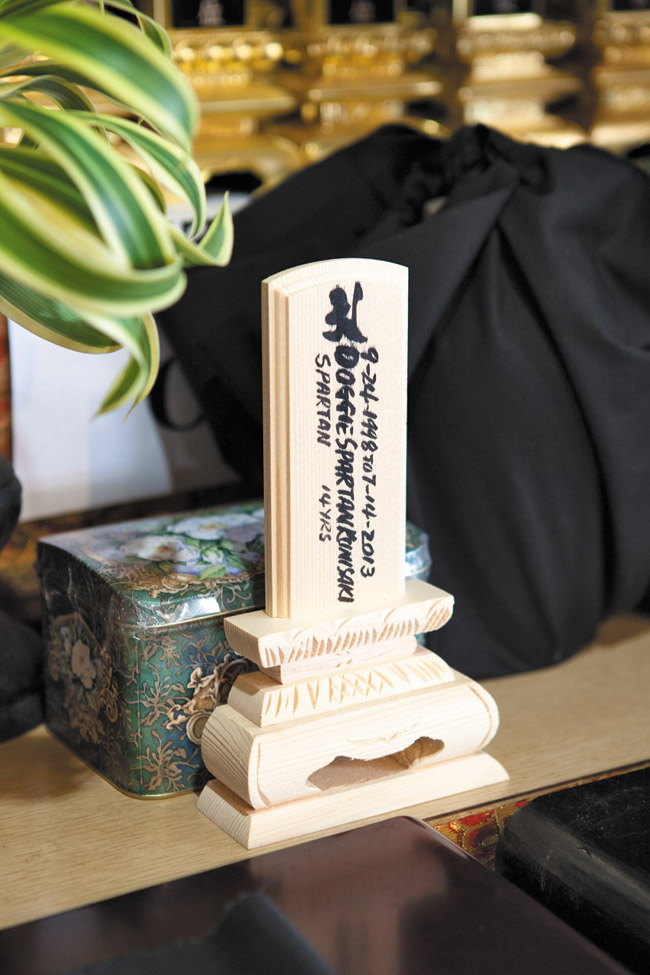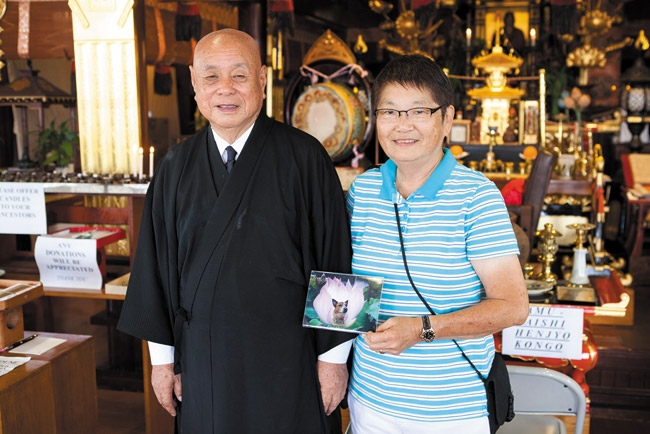Putting A Beloved Pet To Rest
Rev. Taiken Akiyama of Haleiwa Shingon Mission performs funerals for pets just as he does for humans
Step into Haleiwa Shingon Mission and the aroma of incense evokes a calming, almost hypnotic sensation that puts one at ease. In the center of the temple sits the Rev. Taiken Akiyama, a scholar and teacher of Buddhist philosophy. Among his duties is performing traditional Buddhist ceremonies, including funerals.
mw-nm-102313-petfuneral-1
But unlike many, he also performs funerals for pets. Although English is not his first language, Akiyama says he is merely following the Buddhist principle of equality of all sentient beings. It also brings comfort and closure to pet owners who are able to send off their furry family members with respect and dignity.
He says that in the Buddhist view everybody, everything – including animals, trees, all of nature – are in the same line with us humans.
“No up, but no down,” he continues. “Even though time and location and looks are different, they’re all valuable in this universe.
“That’s our way of thinking, so human beings are respected and animals are respected.”
In Hawaii, locals understand the concept of having a pet that is “part of the family.” At least half of isle families have a pet. Pets adorn Christmas cards along-side the human ohana and occasionally even get birthday gifts on their special day.
It is this feeling that fuels the desire of pet owners to provide their pets with a proper funeral.
“They are treated like a family member,” says Akiyama. “When one of the family members dies, we make a funeral service.
Even if a pet dies, we like to treat them the same as family members.”
Susan Kunisaki brought Akiyama the ashes of her dog Spartan, and she describes the experience as “clear and weightless.”
“It’s very difficult to explain unless you experience it, but it’s like your body has no weight,” she says. “It was free and clear, everything was so pure.”
Kunisaki says that if people want to have closure after their pet’s passing, Akiyama is the person to see.
“The feeling is very pure and your mind is clear,” she reiterates. “This is for anybody who wants to honor and respect their animals. They are like family members to most people.”
Kunisaki also chose to erect a stupa (sotoba in Japanese) in honor of Spartan. Stupa is the Sanskrit word for the dome-shaped structure erected as a Buddhist shrine. A handful of stupa hang outside Haleiwa Shingon Mission and represent a creature (human or animal) that has passed away. At the top of the stupa are five Sanskrit characters that represent sky (universal space), wind, fire, water and land. Below that is the Japanese kanji representing “for.”
The creature’s bodai (Japanese for the Sanskrit word bodhi) comes next. In Kunisaki’s case, her dog’s name reads “Doggie Spartan Kunisaki Bodai.”
Amazingly, Akiyama hand writes every single stupa that is erected in front of the temple, and he prays over the stupa every evening until the next bon season.
In the Buddhist belief system, all creatures are born as spirits and we are all connected. When the body dies, the spirit lives on, but in order to do that the spirit must separate from the body.
“The memorial service is to detach,” Kunisaki says. “It’s sending them to the other world.”
Pet funerals are performed in much the same way Akiyama performs a human funeral, and he says the process is meant to free the being’s spirit from all attachments.
“First we have the attachment of the body, because the body and spirit stay together for the whole life,” he says. “Body is the material portion, it’s always changing, changing, changing.
“When the heartbeat stops, that’s another big step of change. Besides that, the no-change portion is the spirit. Spirit is a power.”
He explains that when the heartbeat stops, the spirit must be separated from the body, which returns to the soil.
“Our spirit exists,” he says. “The doggie spirit exists.”
According to Akiyama, the spirit dwells in the oihai, which are little monuments that enshrine the life force. No matter the religious denomination, Akiyama prays over each oihai every morning. He even made one when President John F. Kennedy was shot. “I was very shocked (when he got shot),” he says, “so I made one for President Kennedy’s spirit and I prayed.”
Kunisaki’s Spartan also has his own oihai, where his spirit resides and is allowed to freely come and go.
It’s always hard to say goodbye to a loved one, and our domesticated companions are no different. Thanks to Akiyama, animal owners can rest assured that they are sending off their pets to the other side with the same respect they would want for themselves.







